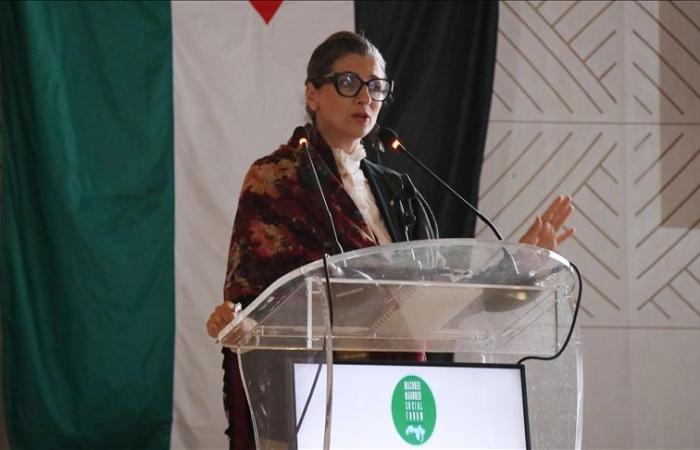AA / Genève / Beyza Binnur Donmez
Despite historic measures such as arrest warrants issued by the International Criminal Court (ICC), political expediency continues to overshadow and override the force of international law when it comes to holding people accountable. Israel, declares the UN Special Rapporteur on the situation of human rights in the Palestinian territories occupied since 1967, Francesca Albanese.
”I believe that the ICC arrest warrants constitute a historic decision. This is the first time they have been issued against leaders considered Western, because Israel is part of the Western bloc… It is important to advance the application of international law, especially when it comes to atrocious crimes ”Albanese said in an interview with Anadolu.
However, she continued, countries, such as Hungary, Italy and France, have given pretexts or declared that they will not implement the arrest warrants against Israeli Prime Minister Benjamin Netanyahu and his former Defense Minister Yoav Gallant.
”Some say they must interpret the meaning of arrest warrants issued by the ICC. There is nothing to interpret. There is an order from the highest criminal court in the world that must be carried out,” she said.
All states parties to the Rome Statute ”must arrest anyone who is the subject of an ICC arrest warrant,” she stressed, rejecting France’s recent assertion that Netanyahu enjoys immunity from arrest warrants because Israel is not ”a state party to the ICC”.
”This means that political expediency continues to eclipse the strength, the solidity of international law. It is a way of destroying, invalidating and canceling the protective function that international law has,” she added.
Albanese pointed to the international community’s inaction despite mounting evidence of Israel’s direct intent to destroy the Palestinians as a group, which formed the basis of the findings of his recent report titled “The ‘colonial erasure through genocide’, presented to the United Nations General Assembly.
”Evidence demonstrating direct Israeli intent has become more and more available, more and more ostentatious, because it is clear that Israel has destroyed Gaza and destroyed the lives of Palestinians in Gaza, also as part of its efforts decades to eliminate Palestinian life, Palestinian identity, from what remains of Palestine,” she insisted.
**Genocide terminology ‘meets less hostility’
Regarding the importance of characterizing Israel’s actions as genocide, Albanese stressed that Palestinians could never be “effectively protected if the grave threats they face from Israel are not understood.”
In Gaza, Israel has killed or injured nearly 150,000 Palestinians, mostly women and children, since the attacks perpetrated by Hamas on October 7, 2023 against the Jewish state, while a permanent and deliberate blockade has led to serious shortages of food, drinking water and medicine, bringing the Gazan population to the brink of famine.
”There must be accountability for acts of genocide because the intent to destroy, the determination and the mindset to destroy are fully evident,” Albanese said.
”It’s about calling a spade a spade. If you go to the doctor and are diagnosed with the wrong problem, then the wrong remedy will probably be prescribed,” she explained.
Among the small progress made, the UN rapporteur cites the fact that ”the use of terminology linked to genocide now encounters less hostility than before”.
One of the goals of her investigations and reports was “to offer people the opportunity to understand what genocide is,” she said.
”Obviously, we are still very confused, regardless of the number of genocides committed, so this served educational purposes, while reminding Member States of their responsibilities,” argued the UN expert Albanese.
”I see that even in the language used in the arrest warrants issued by the ICC, particularly against Israeli leaders, there is reference to the creation of conditions calculated to destroy the group or to cause starvation or death , so it’s a language that resonates with the analysis of genocide.
”The sad reality, however, is that Western member states are failing to act accordingly,” she said, while most U.N. politicians ”also refrain from using the term genocide.
”I don’t dispute what they say, nor the validity of what they say. I’m simply saying that there have been enough investigations… We cannot wait until a genocide is over before taking action,” said the UN rapporteur.
”When it comes to Israel, there is, including at the UN, a reluctance to deal with Israel for what it does, for the conduct and the actual acts it commits, particularly against “towards the Palestinians, but also towards the Lebanese,” she observed.
On the other hand, she added, there are also member states like South Africa and others that have joined its genocide case against Israel before the International Court of Justice. ”So things are moving, but very slowly,” Albanese said.
**”The new US administration seems more pro-Israeli than ever”
Addressing international dynamics, Albanese expressed pessimism about the impact Donald Trump’s second term as U.S. president-elect could have on global efforts to pressure and hold Israel accountable. leaders.
”The new US administration seems more pro-Israeli than ever, so there is a good chance that the situation will continue to get worse… This leaves little room for hope of improvement,” said UN rapporteur united.
”I really hope that many countries, particularly Western ones, which have already shown that they have very little interest in respecting international law, will back away from their close alliance with the United States. United,” she stressed.
It’s an unlikely prospect because it ”signifies the dissolution of the order we’ve had since post-World War II until today,” she explained.
Addressing the recent ceasefire between Israel and Lebanon, Albanese dismissed the possibility that it would translate into a truce in Gaza, a claim supported by several countries including the United States.
”I don’t think the ceasefire in Lebanon will have any impact on achieving a ceasefire in Gaza,” she said.
”Israel had its own concerns and reasons for reaching a ceasefire with Lebanon, while there is no pressure – from within or without – significant enough to force Israel to stop its assault on Gaza,” she said.
Given the “unacceptable” living conditions of Palestinians in Gaza, it is up to all “citizens of the world to mobilize to ensure that our political leaders respect international law and suspend their relations with Israel – military, strategic, economic , and politics,” she underlined.
”It’s time to think about sanctions and treat Israel as a state that commits international crimes,” argued Francesca Albanese.
*Translated from English by Majdi Ismail
Only part of the dispatches, which the Anadolu Agency broadcasts to its subscribers via the Internal Broadcasting System (HAS), is broadcast on the AA website, in summary form. Please contact us to subscribe.






